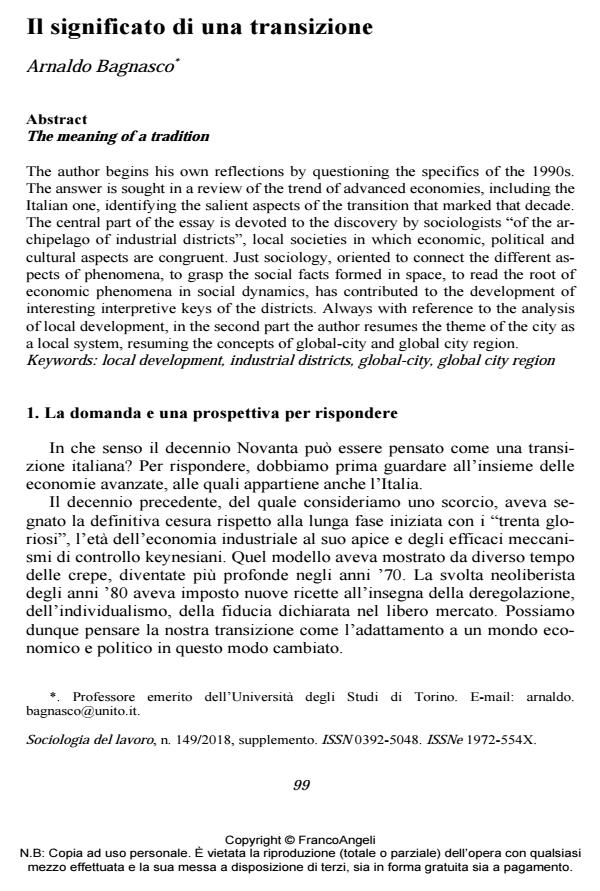The meaning of a tradition
Journal title SOCIOLOGIA DEL LAVORO
Author/s Arnaldo Bagnasco
Publishing Year 2018 Issue 2018/149 suppl.
Language Italian Pages 15 P. 99-113 File size 184 KB
DOI 10.3280/SL2018-149S08
DOI is like a bar code for intellectual property: to have more infomation
click here
Below, you can see the article first page
If you want to buy this article in PDF format, you can do it, following the instructions to buy download credits

FrancoAngeli is member of Publishers International Linking Association, Inc (PILA), a not-for-profit association which run the CrossRef service enabling links to and from online scholarly content.
The author begins his own reflections by questioning the specifics of the 1990s. The answer is sought in a review of the trend of advanced economies, including the Italian one, identifying the salient aspects of the transition that marked that decade. The central part of the essay is devoted to the discovery by sociologists "of the archipelago of industrial districts", local societies in which economic, political and cultural aspects are congruent. Just sociology, oriented to connect the different aspects of phenomena, to grasp the social facts formed in space, to read the root of economic phenomena in social dynamics, has contributed to the development of interesting interpretive keys of the districts. Always with reference to the analysis of local development, in the second part the author resumes the theme of the city as a local system, resuming the concepts of global-city and global city region.
Keywords: Local development, industrial districts, global-city, global city region
- AIS (Associazione Italiana di Sociologia) (1996). La transizione italiana degli anni ’90. Reti, contesti, attori in una società che cambia. Sociologia del lavoro, 63.
- Bagnasco A. (2003). Società fuori squadra. Come cambia l’organizzazione sociale. Bologna: Il Mulino.
- Becattini G. (2007). Dal distretto industriale allo sviluppo locale. Scritti sulla Toscana. La ricerca sul campo e la «Libera Scuola» di Artimino. Firenze: Le Monnier.
- Berta G. (2016). Che fine ha fatto il capitalismo italiano? Bologna: Il Mulino.
- Brusco S. (1999). The rules of game in industrial districts. In: Grandori A., a cura di, Interfirm Networks. Organization and Industrial Competiveness. London and New York: Routledge, pp. 17-40.
- Colli A. (2002). Il quarto capitalismo. Un profilo italiano. Venezia: Marsilio.
- Dematteis G., a cura di (2011). Le grandi città italiane. Società e territori da ricomporre. Venezia: Marsilio.
- Mariotti S. (2007). Globalizzazione e città: le lepri del capitalismo. Stato e mercato, 1: 79-106. DOI: 10.1425/24305
- Mutti A. (2002). Sociologia economica. Il lavoro fuori e dentro l’impresa. Bologna: Il Mulino.
- Paci M. (2015). Lezioni di sociologia storica. Bologna: Il Mulino.
- Perulli P., a cura di (2012). Nord. Una città regione globale. Bologna: Il Mulino.
- Pichierri A. (1990). Cooperazione, regolazione politica, successo economico nelle formazioni sociali locali. Sociologia del lavoro, 41-42: 71-82.
- Sassen S. (1991). The Global City: New York, London, Tokyo. Princeton: Princeton University Press (trad.it. Città globali: New York, Londra, Tokyo. Torino: Utet, 1997).
- Scott A.J., a cura di (2001). Global City-Regions. Trends, Theory, Policy. Oxford: Oxford Universiy Press.
- Tosi S., Vitale T. (2016). Modernizzazione, agire di comunità e azione collettiva. Stato e Mercato, 2: 241-272. DOI: 10.1425/84069
- Trigilia C. (2005). Sviluppo locale. Un progetto per l’Italia. Bari-Roma: Laterza.
Arnaldo Bagnasco, Il significato di una transizione in "SOCIOLOGIA DEL LAVORO " 149 suppl./2018, pp 99-113, DOI: 10.3280/SL2018-149S08